Intramolecular forces - Study guides, Class notes & Summaries
Looking for the best study guides, study notes and summaries about Intramolecular forces? On this page you'll find 174 study documents about Intramolecular forces.
Page 3 out of 174 results
Sort by
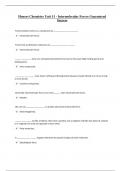
-
Honors Chemistry Unit 11 - Intermolecular Forces Guaranteed Success
- Exam (elaborations) • 5 pages • 2024
-
Available in package deal
-
- $9.89
- + learn more
Honors Chemistry Unit 11 - Intermolecular Forces Guaranteed Success Forces between atoms in a compound are _______________ ______. ️ Intramolecular forces. Forces that act between molecules are _______________ ______. ️ Intermolecular forces. _____ _________ have very strong bonds (attractive forces) so they have high melting points and boiling points. ️ Ionic compounds. ________ _________ have lower melting and boiling points because covalent bonds are not as stron...
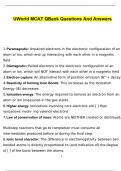
-
UWorld MCAT QBank Questions Missed Exam Questions And Answers
- Exam (elaborations) • 11 pages • 2024
-
- $9.49
- + learn more
UWorld MCAT QBank Questions Missed Exam Questions And Answers Paramagnetic - answerUnpaired electrons in the electronic configuration of an atom or ion, which end up interacting with each other in a magnetic field Diamagnetic - answerPaired electrons in the electronic configuration of an atom or ion, which will NOT interact with each other in a magnetic field Electron capture - answerAn alternative form of positron emission (B^+ decay) Reactivity of forming Ionic Bonds - answerThis increases as ...
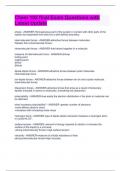
-
Chem 102 final Exam Questions with Latest Update
- Exam (elaborations) • 6 pages • 2024
-
Available in package deal
-
- $10.49
- + learn more
phase - ANSWER-Homogeneous part of the system in contact with other parts of the system but separated from them by a well defined boundary. intermolecular forces - ANSWER-attractive forces between molecules. Weaker than intramolecular forces. intramolecular forces - ANSWER-hold atoms together in a molecule measure of intermolecular force - ANSWER-ΔHvap boiling point melting point ΔHfus ΔHsub dipole-dipole forces - ANSWER-attractive forces between polar molecules. intermolecul...
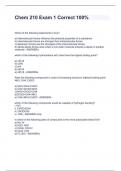
-
Chem 210 Exam 1 Correct 100%
- Exam (elaborations) • 1 pages • 2024
-
Available in package deal
-
- $10.99
- + learn more
Which of the following statements is true? a) intermolecular forces influence the physical properties of a substance b) intermolecular forces are stronger than intramolecular forces c) dispersion forces are the strongest of the intermolecular forces d) dipole-dipole forces arise when a non polar molecule induces a dipole in another molecule - ANSWERa which of the following hydrocarbons will. have have the highest boiling point? a) c5h12 b) c2h6 c) ch4 d) c6h14 e) c8h18 - ANSWERe ...
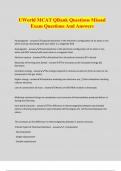
-
UWorld MCAT QBank Questions Missed Exam Questions And Answers
- Exam (elaborations) • 7 pages • 2024
-
- $11.49
- + learn more
UWorld MCAT QBank Questions Missed Exam Questions And Answers Paramagnetic - answerUnpaired electrons in the electronic configuration of an atom or ion, which end up interacting with each other in a magnetic field Diamagnetic - answerPaired electrons in the electronic configuration of an atom or ion, which will NOT interact with each other in a magnetic field Electron capture - answerAn alternative form of positron emission (B^+ decay) Reactivity of forming Ionic Bonds - answerThis increa...
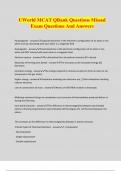
-
UWorld MCAT QBank Questions Missed Exam Questions And Answers
- Exam (elaborations) • 7 pages • 2024
-
- $11.49
- + learn more
UWorld MCAT QBank Questions Missed Exam Questions And Answers Paramagnetic - answerUnpaired electrons in the electronic configuration of an atom or ion, which end up interacting with each other in a magnetic field Diamagnetic - answerPaired electrons in the electronic configuration of an atom or ion, which will NOT interact with each other in a magnetic field Electron capture - answerAn alternative form of positron emission (B^+ decay) Reactivity of forming Ionic Bonds - answerThis increa...
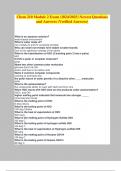
-
Chem 210 Module 2 Exam (2024/2025) Newest Questions and Answers (Verified Answers)
- Exam (elaborations) • 5 pages • 2024
- Available in package deal
-
- $10.49
- + learn more
Chem 210 Module 2 Exam (2024/2025) Newest Questions and Answers (Verified Answers) What is an aqueous solution? water-based environment What is water made of? non-metals (O and H) covalently bonded Why can small non-metals form stable covalent bonds Due to the significant overlap of the atoms What is the hybridization of H2O (2 bonding pairs 2 lone e pairs) sp3 Is H2O a polar or nonpolar molecule? polar Name two other common polar molecules glucose due to its OH acetic acid due to ...
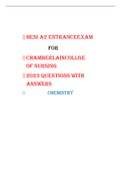
-
HESI A2 CHEMISTRY-CHRISJAY FILES (1) (1)
- Exam (elaborations) • 54 pages • 2023
-
- $14.99
- 1x sold
- + learn more
HESI A2 ENTRANCEEXAM FOR CHAMBERLAINCOLLGE OF NURSING 2023 QUESTIONS WITH ANSWERS CHEMISTRY HESI A2 CHEMISTRY V1/V2 FILE 1. If a Hydrogen isin a compound, what would its oxidation number be? +1 2. What isthe oxidation number of any simple ion? +1 or -1 depending on the charge of the ion 3. How many kilograms are in a pound? 0. kg 4. What is the temperature for freezing point of water in Celsius? 0 degrees Celsius (32°F for Fahrenheit) 5. What is the conversion of Celsius to Fah...
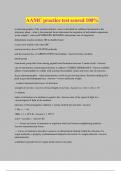
-
AAMC practice test scored 100%
- Exam (elaborations) • 5 pages • 2024
- Available in package deal
-
- $11.49
- + learn more
AAMC practice test scored 100% in chromatography of the reaction mixture, water is absorbed on cellulose functioned as the stationary phase - what is the principal factor determine the migration of individual components in the sample? -Answer-HYDROGEN BONDING (determines rate of migration) dehydration reaction (tertiary OH to double bond) occurs most readily with what OH? reaction involves loss of WATER molecule and the reaction has a CARBOCATION intermediate -Answer-tertiary alcohols am...
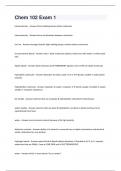
-
Chem 102 Exam 1(100% correct and graded A+)
- Exam (elaborations) • 7 pages • 2024
- Available in package deal
-
- $7.99
- + learn more
Intramolecular - Answer-forces holding atoms within molecules intermolecular - Answer-forces of attraction between molecules Ion-ion - Answer-strongest bonds; high melting temps; involve cations and anions ion-permanent dipole - Answer-salts + polar molecules (water); metal ions with water or other polar mol. dipole-dipole - Answer-bind molecules with PERMANENT dipoles; seen in BPs of simple molecules hydrophilic molecules - Answer-attraction to water; polar; O-H or N-H bonds; soluble in w...

Study stress? For sellers on Stuvia, these are actually golden times. KA-CHING! Earn from your study resources too and start uploading now. Discover all about earning on Stuvia


